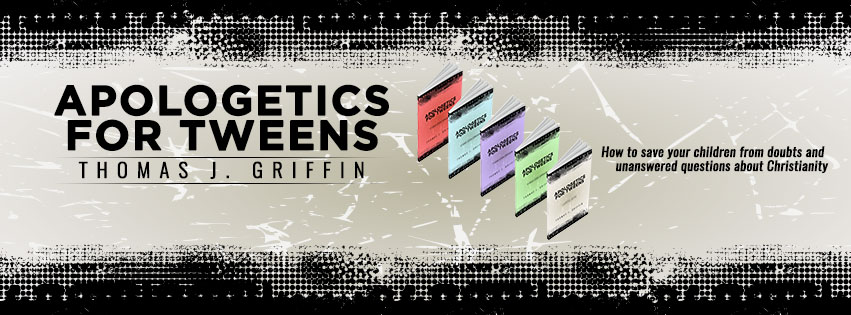By Tom Griffin
Recently I attended the Great Homeschool Southeast Convention in Greenville, South Carolina. Some 2000 homeschool teachers attended to search and review homeschool curriculum material and to listen to speaker workshops pertinent to homeschool teacher issues. It was gratifying and somewhat surprising how many stopped by my exhibitor booth to say they had checked off my apologetics curriculum for 10-14 year olds in advance to review my curriculum and planned to attend my speaker workshop. I am no major organization so it was clear they know about apologetics and the tragedy of the youth exodus and want to do something about it. Often times, they mentioned that their current curriculum packages had some small portion devoted to apologetics but either it did not cover the needed age groups or it was incomplete and insufficient to make a difference.
During my speaker workshop, about 50 people attended the Apologetics for Tweens discussion. When asked why they attended, answers varied from the need to help them defend their faith to a desire to prevent doubts about Christianity from taking root and leading to skepticism, atheism and an exit from the church. We already know that 70% of Christian youth follow this path by age 22. Often times the reason is simply doubts about Christianity due to unanswered questions or misunderstandings about the Bible and science.
In our discussion, I emphasized the need for teaching apologetics at a much younger age than previously thought. Research shows that after age 12 only 7-10% accept Christ. This is clear data that proves they need to understand why they believe in Christ before questions turn to doubt. Some 16 of the teachers purchased the Apologetics for Tweens curriculum, either for a single year, a couple years or for all 5th, 6th, 7th and 8th grade curriculum. It was very rewarding to see teachers literally squeal with excitement as they hugged the curriculum close to their chests and walked away. I do not exaggerate. Recently in my own church, when I announced to several homeschool teachers that our church was implementing my apologetics curriculum for our middle schoolers, they began jumping up and down and hugging each other. I kid you not. One of them brought over her 8th grade son whom I taught in 5th grade. When she told him the news, he just grinned sheepishly and swayed back and forth as though he had been told he was getting a new bike for Christmas. Yet why should I be amazed that parents and teachers care so much about the final destiny of their students and kids and want to ensure they do everything possible to prevent doubt from leading to rebellion from the faith and church?
Frequent questions had to do with whether a few lessons would be sufficient to help the students and address the doubt issues. Although this could be the case with exceptionally attentive and bright students, the best plan is for repetition, emphasis, reinforcement and testing through games, contests and competition over an entire calendar year. The goal is that by the end of the year, the confidence for the student that the evidence points to the truth of Christianity should be central and evident. Many students will also know and remember specific pieces of evidence such as eyewitness testimony for the resurrection or that God exists due to creation. However, the mere understanding that Christianity is true should be sufficient alone to help alleviate doubt. Even when they fail to recall a particular answer about an objection to Christianity, they will remember there is one and that they were taught the answer and thereby avoid the typical path of question, doubt, skepticism, and eventually atheism or the rebellion of their faith.
The curriculum reinforcement over multiple years is best just as any type of repetition in learning is best. A common question was whether each year of the curriculum builds on prior knowledge. The answer is mainly no. Since there are always new students and some students will miss some lessons, each yearly curriculum is designed to operate independent of the others. Although it is true that the 8th grade curriculum includes additional ‘cultural’ lessons about abortion, same sex marriage, gender, homosexuality and a couple deeper science-related lessons, mainly the top 10-15 key apologetics lessons are included in each curriculum year, although they are featured uniquely in each case.
Another question that came up was whether they need apologetics training themselves to teach it and what about more detailed questions that might come up from the lesson that they could not answer themselves. I assured them that the material was written at the 5th grade level for anyone to understand so there was no reason they could not be comfortable teaching it without any apologetics background themselves. As far as additional questions, my availability via email or phone is included as support for my curriculum. I will answer any and all questions that come up so there is no need to worry.
Apologetics is not just for evangelizing nonbelievers, nor is it only for adults. In fact, unless we implement consistent teaching/training at the earliest conceivable ages where questions and doubts develop, we will never stem the problem of the youth exodus in the church. Unfortunately, if serious doubt creeps in by high school graduation, it will often be too late to overturn the doubt for many of the youth at that point.
Let’s all agree this is a critical issue and begin to put a stop to it now through the implementation of proven solutions directly from the classroom of youth as young as ages 10-11. Contact me for questions at tjgconsult@aol.com or call me for a more detailed discussion at 770-597-2654. Can you really afford to take the chance your children and students will be fine without any apologetics training?


